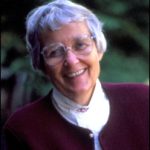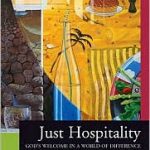Russell, Letty M. Just Hospitality: God’s Welcome in a World of Difference. Westminster John Knox Press, 2009. ISBN: 978-0-66423315-0. (Note: Clarkson, J. Shannon and Ott, Kate M. are editors.)
Letty Russell was an ordained Presbyterian (PCUSA) pastor, one of the world’s foremost feminist theologians and a longtime member of the Yale Divinity School faculty. She was among the first women ordained by the then United Presbyterian Church and was committed to ecumenical causes throughout her career, including the World Council of Churches. The author or editor of over 17 books, her book Church in the Round: Feminist Interpretations of the Church and her co-edited work, Dictionary of Feminist Theologies, characterized her commitment to feminist/liberation theologies and to the renewal of the church.
While Russell had long lectured on the topic of Christian hospitality, it was only after her death that her partner, J. Shannon Clarkson and a former student and teaching assistant Kate M. Ott worked together to turn those notes and Russell’s life experiences into a book. Clarkson directs the International Feminist Doctor of Ministry program at San Francisco Theological Seminary. Ott is Associate Director of the Religious Institute on Sexual Morality, Justice and Healing and a lecturer at Union Theological Seminary.
Russell understands hospitality as “the practice of God’s welcome, embodied in our actions as we reach across difference to participate with God in bringing justice in healing to our world in crisis” (p.14). She explores the need for Christians to embrace the other as equal and as partner and to see differences as God’s gift of diversity. In Scripture, Russell sees God’s welcome or hospitality as having four overlapping components: unexpected divine presence, advocacy for the marginalized, mutual welcome and creation of community. For the church today, hospitality must be viewed as a central issue for those who want the church to matter in the larger culture.
So What?
Each chapter of Just Hospitality concludes with application questions. Here are a few to consider:
- Think about the phrase “that all may freely serve.” Does your faith community offer a variety of ways for different people to serve? What are these opportunities? What might be other ways ministries of hospitality could be expanded to be more inclusive? (p. 22)
- Give an example of how you might seek unity through hospitality in your ministry. (p.75)
- What are the limitations to your own practice of hospitality? How do you see God working through and beyond your own limits? (p. 124)

